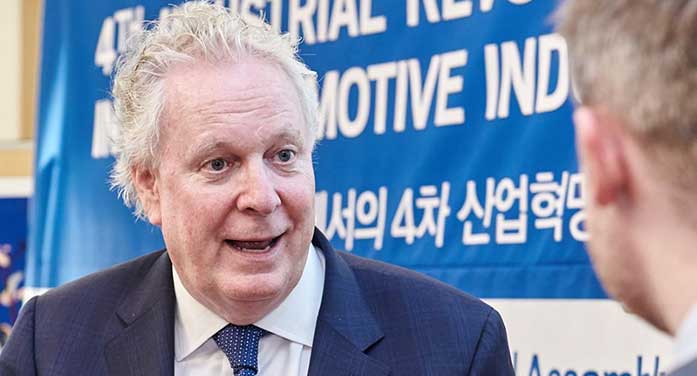 On the occasion of his 2012 departure from Quebec provincial politics, I wrote a column asking: Is it au revoir Jean Charest?
On the occasion of his 2012 departure from Quebec provincial politics, I wrote a column asking: Is it au revoir Jean Charest?
Although Charest was relatively young (54) and had spent most of his adult life in politics, it was hard to see a future for him.
Now he’s back. And he’s running for the federal Conservative leadership.
Charest was a big wheel in the old federal Progressive Conservatives. He even served as its leader for a few years after the 1993 debacle reduced it from a majority government to two seats. But while he performed respectably in that capacity, he was unable to restore the party’s position as the default option for conservatively-inclined voters. Then he moved to the Quebec stage, became leader of the provincial Liberals and served nine years as premier.
His early political history notwithstanding, Charest has had little or no public association with the modern Conservative Party of Canada. When the party was in government and he was Quebec premier, he was sometimes at odds with it. And there’ve been subsequent comments suggesting his discomfort with what the party has become.
Nonetheless, he’s now keen to become leader.
Charest’s selling proposition is that he’s “built to win” and will thus take the Conservatives back to power in Ottawa. It’s a promise that party members have heard before. Erin O’Toole’s failed leadership was pitched on the same premise.
Charest would undoubtedly win some votes that’d be out of reach for his main rival, Pierre Poilievre. Whether it would translate into many extra seats is a different issue.
And there’s the other side of the equation: How many current Conservative seats would Charest lose through erosion of the right-of-centre base vote?
Because the modern Conservatives aren’t philosophically the same as the 1970s and 1980s party of Joe Clark and Brian Mulroney, it’s a mistake to assume they’d all meekly accept Charest. As someone who came to prominence during the Mulroney years, Charest can be considered emblematic of the kind of Red Tory whose dominance prompted the fatal Reform revolt of the 1990s.
Winning power isn’t enough for many in the modern party. What matters is what you do with it. And governing in a manner virtually indistinguishable from the Liberals isn’t worth the candle.
Within the party membership – the electorate that’ll decide the leadership – Charest is thus vulnerable to the charge of not being a ‘real conservative.’ Fair or otherwise, it’s something he’ll have to explicitly address.
But Charest has a defender whose conservative/libertarian credentials are impeccable. Writing in the Financial Post and focusing on Charest’s tenure as Quebec premier, Montreal-based economist William Watson takes issue with the “not a real conservative” charge.
Watson cites Charest’s attempt to remove “an unfair and unjustifiable subsidy to the upper-middle class” by raising Quebec’s lowest-in-the-country university tuition fees. It was, Watson believes, an exercise in political courage that should appeal to conservatives.
Why Jean Charest’s new political identity doesn’t fly by Michael Taube
The Conservative leadership hopeful is attempting to rewrite history
And projecting what Charest’s Quebec record might look like if replicated federally, Watson has this to say: “A federal government that in its first three years trimmed the civil service, reduced spending as a share of GDP, abolished 16 agencies and published a list of the several hundred more from which another 10 per cent would be targeted would be a federal government that would be plenty blue enough for lots of Canadians.”
It’s not that Watson is in love with Charest. He thinks a candidate combining the best characteristics of Poilievre and Charest would fit the bill nicely. But you deal with the world as it is. Conservatives, of all people, should instinctively understand that.
Early indications are that Charest’s campaign has a mountain to climb. Although the voting structure might help him by virtue of the advantage it conveys to ridings with relatively low memberships – such as those in Quebec – the general orientation of the party isn’t his natural terrain. He’ll need to sell a lot of new memberships.
Still, Charest has two things going for him. One is his personal charm and the other is that many in the media will be in his corner. Expect a lot of coverage emphasizing his comparative “moderation” and putative electability.
Albeit a tad tongue-in-cheek, the late American historian William. J. Rorabaugh was emphatic about the importance that charm has assumed in modern politics: “Be charming. In the television age, it is crucial. If you are not charming, don’t run.”
Stay tuned. It’ll be interesting.
Troy Media columnist Pat Murphy casts a history buff’s eye at the goings-on in our world. Never cynical – well, perhaps a little bit. For interview requests, click here.
The opinions expressed by our columnists and contributors are theirs alone and do not inherently or expressly reflect the views of our publication.
© Troy Media
Troy Media is an editorial content provider to media outlets and its own hosted community news outlets across Canada.

